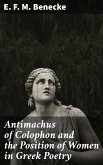Arthur Wing Pinero's "The Big Drum" is a poignant exploration of the human experience, woven into a narrative that reflects the shifting societal norms of the early 20th century. The play, characterized by its realistic dialogue and emotional depth, delves into themes of love, loyalty, and the conflict between personal desires and social expectations. Set against a backdrop of a close-knit community, Pinero masterfully captures the nuances of relationships, utilizing a blend of humor and pathos that marks his significant contribution to the Edwardian theatre landscape. Pinero, a prominent playwright and a key figure in the dramatic movement of his time, brought personal insights to his work stemming from his own experiences in Victorian England. His understanding of theatrical conventions, combined with a commitment to social commentary, informed his craft, making him one of the leading voices in modern drama. "The Big Drum" showcases Pinero's evolution as a writer who deftly negotiates between traditional and innovative narrative forms, reflecting his deep engagement with contemporary issues. This compelling play is highly recommended for readers who appreciate a rich tapestry of character-driven stories that challenge societal norms. Pinero's eloquent prose and empathetic characterizations invite readers to reflect on their values, making "The Big Drum" an essential addition to any literary collection.
Dieser Download kann aus rechtlichen Gründen nur mit Rechnungsadresse in A, B, BG, CY, CZ, D, DK, EW, E, FIN, F, GR, H, IRL, I, LT, L, LR, M, NL, PL, P, R, S, SLO, SK ausgeliefert werden.









